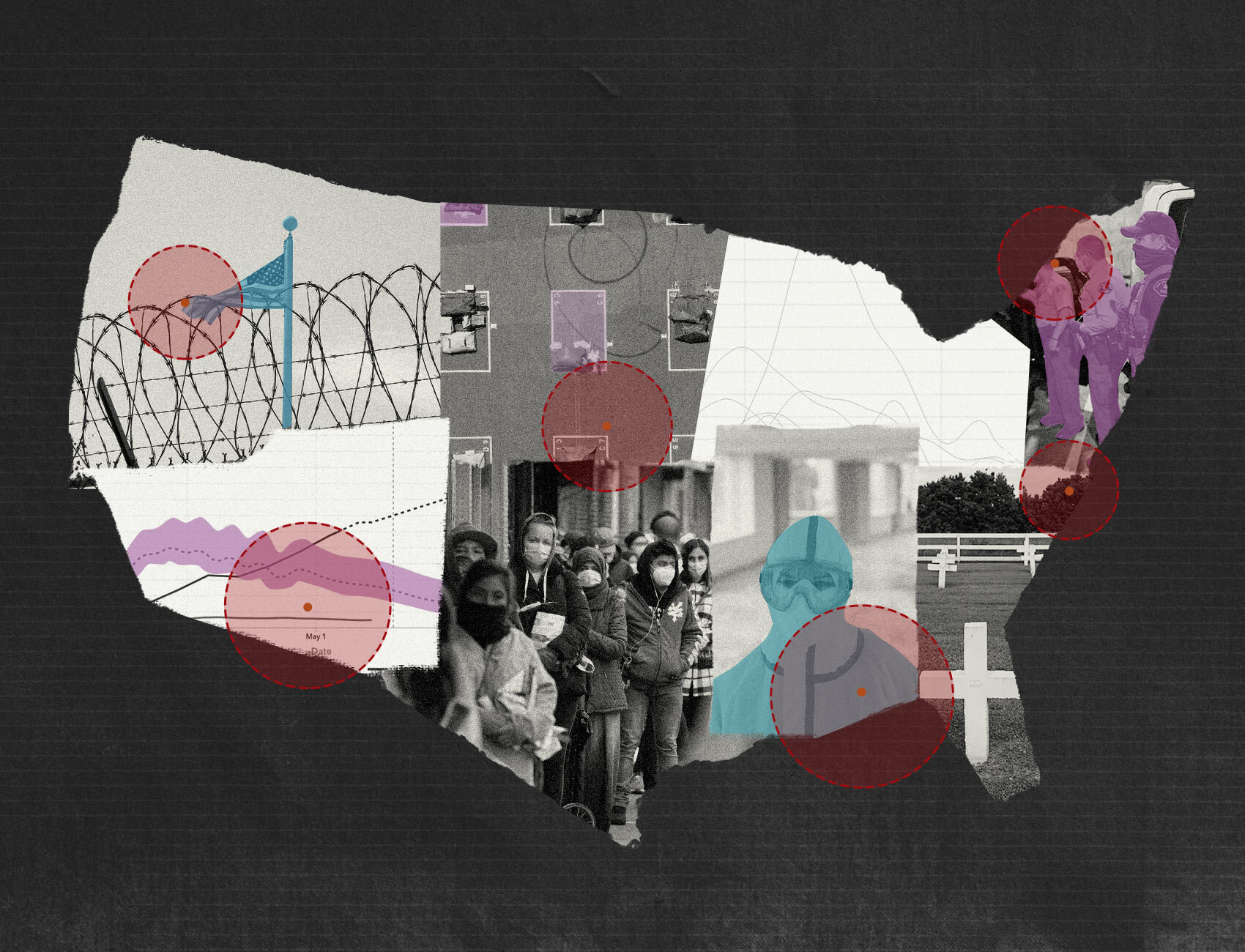Coronavirus In Jails and Prisons
Despite early warnings, jails and prisons have seen a rapid spread of the virus—a humanitarian disaster that puts all of our communities, and lives, at risk. Every day, The Appeal examines the scale of the crisis, numbers of infected and dead, around the nation.

Weeks before the first reported cases of COVID-19 in prisons and jails, correctional healthcare experts warned that all the worst aspects of the U.S. criminal justice system — overcrowded, aging facilities lacking sanitary conditions and where medical care is, at best, sparse; too many older prisoners with underlying illnesses; regular flow of staff, guards, healthcare workers in and out of facilities — would leave detention facilities, and their surrounding communities, vulnerable to outbreaks. Despite those early warnings, even jails and prisons that believed they were well-prepared have seen a rapid spread of the virus. On a daily basis over the next several months, The Appeal will be examining the coronavirus crisis unfolding in U.S. prisons and jails, COVID-19’s impact on surrounding communities and how the virus might reshape our lives. Find daily updates here from Wednesday and Thursday.
This week, a handful of U.S. jails reported their first COVID-19 case. In each instance, the infected person was recently booked into jail. Last Friday, Michigan’s Marquette jail booked a woman who was in the area visiting friends when she was arrested. She told jailers she’d had contact with someone with COVID-19.
Marquette County Sheriff Greg Zyburt told The Mining Journal that the woman, who was released Sunday, was tested and quarantined. The test came back positive and she was notified before being released. The charges against the woman that led to her booking are unclear.
“I know it was inevitable,” Zyburt told the newspaper. “It was going to happen sooner or later, and the staff was quite nervous.”
The Travis County jail in Austin reported its first COVID-19 case yesterday—again, it was a person who’d been in jail a short time and was quarantined immediately. The Austin American-Statesman wrote that the jail “was a notable exception” in Texas where, in state prisons alone, at least 2,495 prisoners and 758 employees have tested positive (the Texas Department of Corrections hasn’t updated its data since May 22).
While some correctional facilities are seemingly COVID-19 free, others are grappling with a spate of new infections. On Wednesday, The L.A. Times reported that at the Men’s Central Jail in downtown L.A. “nearly 60% in a dorm of 67 asymptomatic inmates tested positive for the coronavirus.”
Forty percent of 600 asymptomatic men tested at the North County Correctional Facility in Castaic, a small town northeast of downtown L.A., have tested positive, the Times reported.
At a press conference earlier this week, L.A. County Sheriff Alex Villanueva said “herd immunity”—the idea that people who’ve already had the virus won’t get it a second time—was “starting to take effect” in his jails. He characterized this as a positive development.
The Appeal spoke with two experts on prison conditions about Villanueva’s comment.
“Herd immunity … is not something to aim for in correctional settings,” Michele Deitch, a professor at University of Texas at Austin, said, “because that basically means the agency has not been able to prevent the spread, and countless people have suffered through the ill-effects of the virus and many have died.”
Deitch said jails need to focus on keeping the virus out of their facilities. Villanueva’s comment, she said, seems like an admission that he’s not interested in preventing the virus’ spread in Los Angeles County jails.
“It’s almost like saying, ‘Wow, so many people have the virus here that it no longer matters whether we prevent it,’” she said.
More important, Deitch said, the science is still out on whether a person who’s had the virus is immune from re-infection.
“Plus,” Deitch added, “there is such a huge churn of population in the jail that the virus will continue spreading to people on the outside, regardless of whether people inside are in some way protected by the herd.”
Leo Beletsky, a professor of law and health sciences at Northeastern University, said Villanueva’s comment “betrays a misunderstanding—or deliberate ignorance—about the concept of herd immunity.”
“In epidemiological terms, herd immunity starts to confer substantial benefit when approximately 90% of the population is infected,” he said, “if such infection confers protection from future infection or significantly reduces its intensity.”
Beletsky said the concept of herd immunity in the context of COVID-19 is “being used as a smokescreen” to ignore sensible precautions like social distancing and wearing masks.
“The bottom line is that simply letting this virus rip through L.A. County jails would result in the death of anywhere from 1 to 10% of the population, along with countless staff and L.A. County residents,” he said. “This is the largest jail system in the world; you do the numbers.”
Charlottesville, Virginia’s, CBS affiliate obtained emails through a Freedom of Information Act request showing jailers at Buckingham County’s Dillwyn Correctional Center shrugging off complaints about conditions at the prison from incarcerated people and their families. The emails included messages from the wife of an incarcerated person who said that her husband complained about the re-use of non-disposable trays and the movement of prisoners between pods. Soon after the complaints were made, he was transferred out of Dillwyn to a facility she described as more dangerous. The emails also included a complaint from a correctional officer who emailed Gov. Ralph Northam to complain about the lack of personal protective equipment.
“I am scared for my health and my family’s,” the officer told Northam.
DOC officials, according to emails, called the complaint “false” and suggested that they would take action against the officer.
According to the most recent data from the Virginia Department of Corrections, 322 Dillwyn prisoners have tested positive and nine staff members currently have COVID-19.
